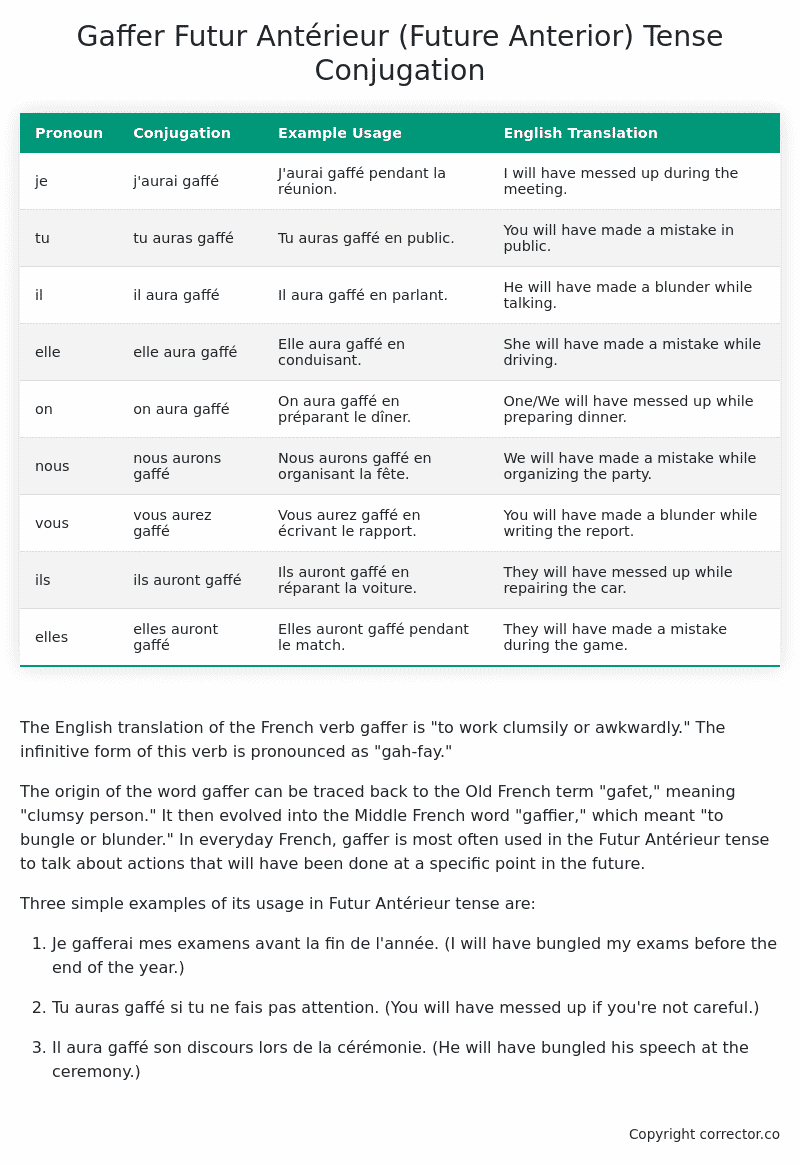Futur Antérieur (Future Anterior) Tense Conjugation of the French Verb gaffer
Introduction to the verb gaffer
The English translation of the French verb gaffer is “to work clumsily or awkwardly.” The infinitive form of this verb is pronounced as “gah-fay.”
The origin of the word gaffer can be traced back to the Old French term “gafet,” meaning “clumsy person.” It then evolved into the Middle French word “gaffier,” which meant “to bungle or blunder.” In everyday French, gaffer is most often used in the Futur Antérieur tense to talk about actions that will have been done at a specific point in the future.
Three simple examples of its usage in Futur Antérieur tense are:
-
Je gafferai mes examens avant la fin de l’année. (I will have bungled my exams before the end of the year.)
-
Tu auras gaffé si tu ne fais pas attention. (You will have messed up if you’re not careful.)
-
Il aura gaffé son discours lors de la cérémonie. (He will have bungled his speech at the ceremony.)
Table of the Futur Antérieur (Future Anterior) Tense Conjugation of gaffer
| Pronoun | Conjugation | Example Usage | English Translation |
|---|---|---|---|
| je | j’aurai gaffé | J’aurai gaffé pendant la réunion. | I will have messed up during the meeting. |
| tu | tu auras gaffé | Tu auras gaffé en public. | You will have made a mistake in public. |
| il | il aura gaffé | Il aura gaffé en parlant. | He will have made a blunder while talking. |
| elle | elle aura gaffé | Elle aura gaffé en conduisant. | She will have made a mistake while driving. |
| on | on aura gaffé | On aura gaffé en préparant le dîner. | One/We will have messed up while preparing dinner. |
| nous | nous aurons gaffé | Nous aurons gaffé en organisant la fête. | We will have made a mistake while organizing the party. |
| vous | vous aurez gaffé | Vous aurez gaffé en écrivant le rapport. | You will have made a blunder while writing the report. |
| ils | ils auront gaffé | Ils auront gaffé en réparant la voiture. | They will have messed up while repairing the car. |
| elles | elles auront gaffé | Elles auront gaffé pendant le match. | They will have made a mistake during the game. |
Other Conjugations for Gaffer.
Le Present (Present Tense) Conjugation of the French Verb gaffer
Imparfait (Imperfect) Tense Conjugation of the French Verb gaffer
Passé Simple (Simple Past) Tense Conjugation of the French Verb gaffer
Passé Composé (Present Perfect) Tense Conjugation of the French Verb gaffer
Futur Simple (Simple Future) Tense Conjugation of the French Verb gaffer
Futur Proche (Near Future) Tense Conjugation of the French Verb gaffer
Plus-que-parfait (Pluperfect) Tense Conjugation of the French Verb gaffer
Passé Antérieur (Past Anterior) Tense Conjugation of the French Verb gaffer
Futur Antérieur (Future Anterior) Tense Conjugation of the French Verb gaffer (this article)
Subjonctif Présent (Subjunctive Present) Tense Conjugation of the French Verb gaffer
Subjonctif Passé (Subjunctive Past) Tense Conjugation of the French Verb gaffer
Subjonctif Imparfait (Subjunctive Imperfect) Tense Conjugation of the French Verb gaffer
Subjonctif Plus-que-parfait (Subjunctive Pluperfect) Tense Conjugation of the French Verb gaffer
Conditionnel Présent (Conditional Present) Tense Conjugation of the French Verb gaffer
Conditionnel Passé (Conditional Past) Tense Conjugation of the French Verb gaffer
L’impératif Présent (Imperative Present) Tense Conjugation of the French Verb gaffer
L’infinitif Présent (Infinitive Present) Tense Conjugation of the French Verb gaffer
Struggling with French verbs or the language in general? Why not use our free French Grammar Checker – no registration required!
Get a FREE Download Study Sheet of this Conjugation 🔥
Simply right click the image below, click “save image” and get your free reference for the gaffer Futur Antérieur tense conjugation!

Gaffer – About the French Futur Antérieur (Future Anterior) Tense
Construction
Common Everyday Usage Patterns
Interactions with Other Tenses
For example
Summary
I hope you enjoyed this article on the verb gaffer. Still in a learning mood? Check out another TOTALLY random French verb conjugation!


